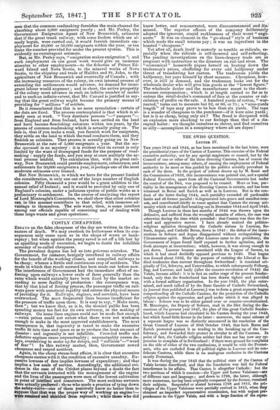COSTLY CHEAPNESS.
ESSAYS on the false cheapness of the day are written in the cha- racters of death. We may overlook its hollowness when its con- sequences only come upon us in the shape of waste or bank- ruptcy ; but when against the penny saved is set off a life lost by an appalling mode of execution, we begin to doubt the infallible economy of so-called cheapness. The prevalent dogma has led us into grievous mistakes. The Government, for instance, benignly interfered in railway affairs for the benefit of the working classes, and compelled railways to be cheap; whence a fertile and continuous crop of accidents. The mode in which that result accrued has been made out before now. The interference of Government had the immediate effect of en- forcing upon railways a lower scale of fares generally than the rates which would naturally have been fixed by the market ac- cording to mere facility of production : the consequence was, that by that kind of forcing process, the passenger traffic on rail- ways grew with unnatural rapidity and outran the physical means of providing for it. Railways, engines, and servants, have been overworked. The most frequented lines became insufficient for the pressure of traffic upon them. It is easy to say, " Make more, then "; but we know that, as it is, the monied public has been spending money too fast for its own solvency, in the making of railways. On some lines engines could not be made fast enough —extra prices could not extort what there were not workmen enough to make in the most approved establishments. The next consequence is, that ingenuity is taxed to make the excessive traffic fit into time and space so as to produce the least amount of disaster : and ingenuity is not infallible. Crowded traffic and defective engines cause unpunctuality; unpunctuality causes de- lays, overdriving to make up for delays, and " collision"—" word of fear"! In this railway matter, ihen, Government sowed Cheapness and reaped accident. Again, in the cheap steam-boat affairs, it is clear that excessive cheapness carries with it the condition oiexcessive unsafety. Ex- cessive lowness of fare implies lowness of expenditure ; and that implies a low scale of service. Accordingly, the additional evi- dence in the case of the Cricket places beyond a doubt the fact that the servants intrusted with the management of the engine and the lives of the passengers were men of the lowest cultivation in point of intellect and conscience. The most reckless servants were actually preferred : these who made a practice of tying down the safety-valve—one of them positively knew no better than to suppose that that was the proper way of working an engine !- were retained and shielded from reproach ; while those who did
know better, and remonstrated, were discountenanced and dirt: missed. The superior officers of the company deliberately adopted the ignorant, stupid recklessness of their worst " engi- neers." It was an element in the " go-ahead " style of business which made the small returns pay ; it was an ingredient in the boasted " cheapness."
Yet after all, death itself is scarcely so terrible as ridicule, es- pecially when the ridicule is self-incurred and self-reflecting. The pending investigations on the linen-drapery trade are as pregnant with instruction as the disasters on rail and river. The economical " housewife piques herself on beating down the tradesman's prices, chaffering for every odd halfpenny under threat of transferring her custom. The tradesman yields the halfpenny, but pays himself by short measure. Cheapness, how- ever, is still in demand, and the tradesman looks out for the wholesale dealer who will give him goods at the "lowest figure." The wholesale dealer and the manufacturer resort to the short- measure compensation ; which is at length carried so far as to outrun the retail-dealer's command of face at the counter or cal- culation of profits on the sale. A hundred yards of cotton, " war- ranted," turns out to measure but 92, or 86, or 75; a "nine-yards length" of tape may prove to be less than six yards. The tape is a wonder of cheapness to the purchaser—if it were nine yards ; but is it so cheap, being only six ? The fraud is dissipated with an explosion more shocking to our feelings than that of a dis- rupted boiler : we thought ourselves so clever, and find ourselves so silly—accomplices in a conspiracy where all are dupes I


























 Previous page
Previous page